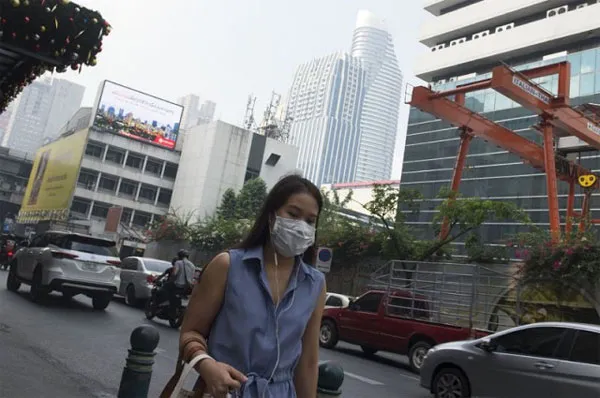Các kỹ thuật áp dụng cho việc tạo mưa này bao gồm rải hóa chất vào không khí giúp mây ngưng tụ dày hơn để có thể tạo ra một cơn mưa. Kế hoạch làm mưa nhân tạo này đạt kết quả nhanh hay không còn phụ thuộc vào gió và độ ẩm không khí.
Thành phố Bangkok của Thái Lan đang gặp tình trạng ô nhiễm nghiêm trọng đến mức độ cần đến mưa nhân tạo để cải thiện tình hình.

Thành phố Bangkok của Thái Lan đang gặp tình trạng ô nhiễm nghiêm trọng đến mức độ cần đến mưa nhân tạo để cải thiện tình hình. Ảnh: AFP
Từ thứ Hai 14/1, người Thái đã phải đối mặt với bầu không khí bao phủ bởi lớp khói mù dày đặc bao phủ thủ đô Bangkok. Tổ chức môi trường Greenpeace đã xếp thành phố Bangkok đứng thứ 10 trong danh sách các thành phố ô nhiễm nhất thế giới, đang có khả năng cạnh tranh với một số thành phố của Trung Quốc.
Lớp khói mù ô nhiễm này là kết quả của khí thải của phương tiện giao thông, việc đốt đồng ở ngoại thành và khí thải từ các nhà máy.
Air Visual, một tổ chức độc lập chuyên giám sát chỉ số chất lượng không khí (AQI), xếp Bangkok và nhóm “đe dọa sức khỏe” với chỉ số AQI ở mức 156 đo hôm 14/1. Cơ quan kiểm soát ô nhiễm Thái Lan cũng xác nhận độ nguy hiểm của tình trạng ô nhiễm ở Bangkok khi đưa ra chỉ số hàm lượng bụi độc hại ở mức PM2,5.
Giám đốc tổ chức bảo vệ môi trường Greenpeace tại Thái lan Tara Buakamsri nói chính quyền thành phố cần có các hành động kịp thời như giảm số lượng xe ôtô và đóng cửa các trường học nằm tại các khu vực nguy cơ cao.
Trong vài tuần qua, các công nhân đã xịt nước khắp các con đường cũng như vào không khí nhằm xua bớt khói mù đồng thời chính quyền cũng khuyến cáo người dân nên ở trong nhà.
Thailand to make it rain as pollution chokes Bangkok
(AFP) - Thailand is set to deploy rainmaking planes to seed clouds in an effort to tackle the pall of pollution that has shrouded the capital in recent weeks.
The weather modification technique involves dispersing chemicals into the air to aid cloud condensation, which should in theory result in rain.
"The Department of Royal Rainmaking and Agricultural Aviation... expects the rainmaking to be done tomorrow (Tuesday) but it depends on wind and humidity levels," Pralong Dumrongthai, director-general of Thailand's Pollution Control Department, told reporters.
As Thais woke up Monday morning to another day of murky air blanketing its bustling construction-filled capital, environment group Greenpeace said Bangkok was currently the 10th most polluted in the world, rivalling some cities in China.
Reasons for the persistent smog include combustion exhaust from Bangkok's traffic-strewn roads, the burning of fields from farmers outside the city, and pollutants from factories.
Public discontent has surfaced on Thai social media and television, with pollution-related hashtags trending and TV hosts advising viewers on the types of face masks they should wear.
Air Visual, an independent online air quality index (AQI) monitor, pegged Bangkok at "unhealthy" levels measuring 156 AQI on Monday -- though numbers have often crept higher in the last two months.
But the Pollution Department played down the dangers of the persistent haze, which the government judges using a different set of measurements to see the concentration of harmful microscopic particles known as PM2.5.
He said Bangkok had recent peak PM2.5 levels of 102 micrograms per cubic metre and on Monday was sitting under 90.
"Our PM figure is high but it is not a crisis yet," he said. "We are not in the range of 120-150 where all people have to wear masks all the time when they are out."
But Greenpeace's Thailand director Tara Buakamsri said immediate action should be taken by the authorities, like reducing the number of cars and closing schools in high-risk areas.
"The pollution issues are more and more frequent in Bangkok. We need smarter air quality management."
In recent weeks, municipal workers have sprayed water along the roads and into the air in Bangkok to help clear the smog, while authorities have urged people to stay indoors.


